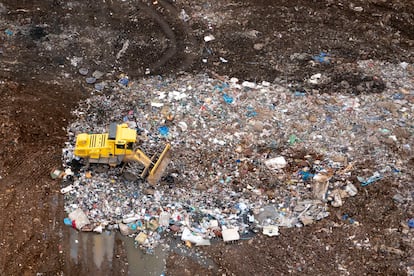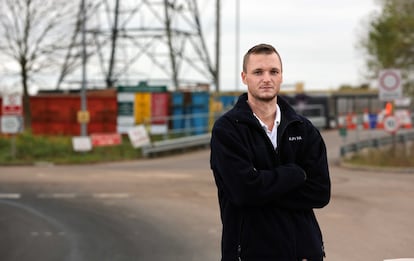The man who threw 8,000 bitcoins away
James Howells, a computer engineer, proposes using robot dogs and a metal arm to recover a hard drive that he lost in 2013. It contains the equivalent of €180 million in cryptocurrencies. He believes it is still sitting in a landfill in Wales.

Forget about pirate chests buried at the bottom of the sea. If you want a real treasure, you may find it in the municipal landfill of the Welsh city of Newport.
There, among 110,000 tons of garbage, is possibly an external hard drive the size of an iPhone 6. It contains the equivalent of more than €180 million in cryptocurrencies. Finding it would, of course, be a Herculean task, comparable to finding a needle in a haystack… if the haystack were a few acres in size. But there is at least one man willing to try: James Howells, a 37-year-old computer engineer. He is the unlucky fellow who, in 2013, threw away a fortune.
As he explained in a recent interview with Business Insider, Howells kept a pair of identical hard drives in a drawer. One was empty – the other contained 8,000 bitcoins that he had processed and validated himself, in one of the domestic mining operations that were beginning to become popular at the time. He wanted to throw away the empty disc, but the one that ended up in the trash was, in fact, the treasure chest.
The tragic oversight occurred at the beginning of the year, at a time when the bitcoins thrown away were worth approximately €100,000. A few months later, they had already exceeded €8.5 million.
We can imagine his sadness, his immense rage… but that’s not the full story. Howells is a tenacious individual, someone who prefers to look for solutions rather than wallow in misfortune. After nine years searching for ways to recover the lost loot, the Welsh computer scientist has devised an avant-garde rescue plan and has requested authorization from the local authorities of Newport to carry it out. What he has in mind is a selective screening of the landfill using robot dogs, a team of human supervisors and a gigantic metal arm connected to an advanced artificial intelligence and image analysis platform.

This operation would cost more than €10 million. Howells, in addition to investing in technological instruments, intends to hire experts in industrial dredging, waste management… and even one of the guys who retrieved information from the black box of the spacecraft Columbia, after it disintegrated in 2003. All contractors would receive fixed amounts, as well as bonuses if the recovery of the hard drive is successful. Furthermore, Howells, in an attempt to compensate for “possible inconvenience,” promises to donate a tenth of the amount recovered to social projects related to crypto assets in the city of Newport.
Howells believes that finding the hard drive is perfectly feasible. “In the most pessimistic scenario, it would take around three years to completely sift through the dump. But the computer simulations that I have carried out suggest that we could finish the task in about 18 months, which would reduce the total cost.”
The robot dogs that he proposes to use are two slender canine patrollers designed by Boston Dynamics. They would scan the garbage, sending the images back to a closed television circuit to be analyzed by AI.
Howells and his team presented their plant to the Newport city council this summer. British journalist Richard Hammond was present at the meeting and even dedicated a short piece on his YouTube channel to Howells and his crusade. In it, he describes those involved as “serious people, who believe in the plan and are willing to commit to it and execute it with professionalism and rigor.”
However, the municipal government, led by Mayor Martin Kellaway, of the Conservative Party, does not seem at all willing to have the rescue team rummage through its landfill. The municipal leaders allege that removing earth and shifting garbage would have “incalculable” ecological and social impacts. They maintain “a strict waste management protocol” to which they intend to abide, without accepting external interference. From Kellaway’s point of view, “the common good cannot be sacrificed to private interests, however understandable and legitimate these may be.”
Howells – who has embarked on an intense media campaign in support of his proposal – has told The Guardian that he is committed to carrying out a surgical excavation and that the garbage unearthed would be “thoroughly cleaned, recycled, or reburied.” He has even offered to carry out improvement works on the landfill, such as the installation of a power plant and a wind turbine. However, as Joe Middleton, editor of The Guardian in Newport, puts it: “No matter how sophisticated the operation, the prospects of success are little short of nil.”
In the nine years since Howells threw his 8,000 bitcoins away, the value went from €100,000 to around €500 million last fall and, finally, after the cryptocurrency market crashed in the spring of this year, settled at €180 million. Economics journalist Miguel Ángel García Vega explains that “the volatility of cryptocurrencies should no longer surprise anyone… they do not serve as a ‘safe haven investment.’ They will never be able to compete with the solvency and stability of traditional assets that are used in extreme situations, such as the Swiss franc, the Swedish or Norwegian krone and, to a lesser extent, gold.”
Cryptocurrencies are volatile, García Vega continues, because “it is in their DNA.” It is no coincidence that “investors and fans resort to words such as betting, playing or risking when they talk about this type of currency.” He sees cryptocurrencies as part of a casino economy rather than “a more serious and well-regulated market.” They lose validity as soon as geopolitical situations become more complicated.
Howells, however, seems undeterred by volatility. The patrol robots, the experts in waste management and the battle with the city of Newport are all part of his elaborate attempt to keep playing in the casino economy.
Tu suscripción se está usando en otro dispositivo
¿Quieres añadir otro usuario a tu suscripción?
Si continúas leyendo en este dispositivo, no se podrá leer en el otro.
FlechaTu suscripción se está usando en otro dispositivo y solo puedes acceder a EL PAÍS desde un dispositivo a la vez.
Si quieres compartir tu cuenta, cambia tu suscripción a la modalidad Premium, así podrás añadir otro usuario. Cada uno accederá con su propia cuenta de email, lo que os permitirá personalizar vuestra experiencia en EL PAÍS.
¿Tienes una suscripción de empresa? Accede aquí para contratar más cuentas.
En el caso de no saber quién está usando tu cuenta, te recomendamos cambiar tu contraseña aquí.
Si decides continuar compartiendo tu cuenta, este mensaje se mostrará en tu dispositivo y en el de la otra persona que está usando tu cuenta de forma indefinida, afectando a tu experiencia de lectura. Puedes consultar aquí los términos y condiciones de la suscripción digital.









































